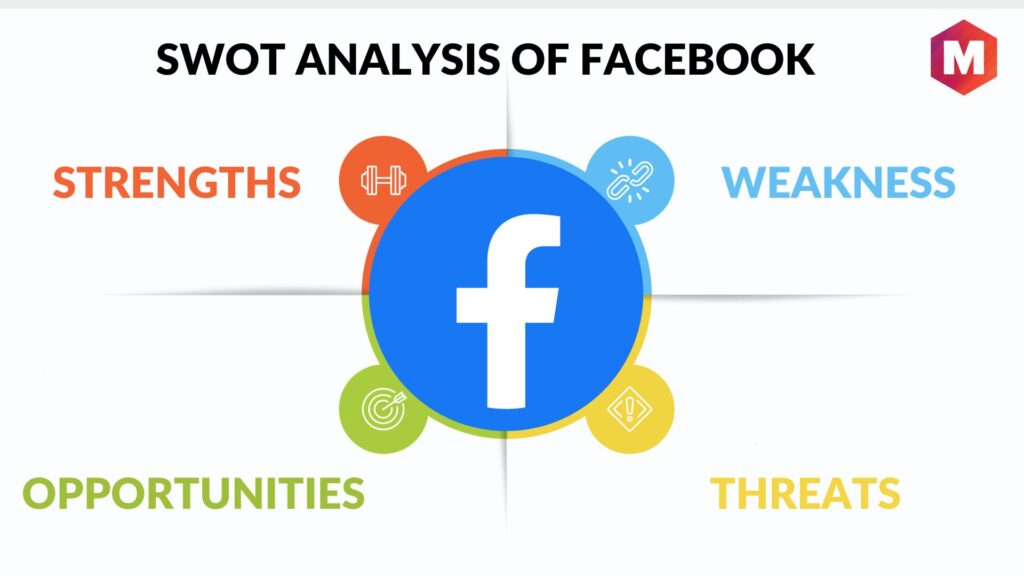Meta Platforms, formerly known as Facebook, is a leading entity in the social media and technology sector. This SWOT analysis aims to evaluate Meta’s strengths, weaknesses, opportunities, and threats, offering a strategic perspective on its future in a rapidly evolving digital landscape.

Strengths of Meta Platforms
- Social Media Dominance: Meta Platforms, with Facebook at its core, dominates the social media landscape. Its vast user base and engagement levels make it a powerhouse in digital connectivity and communication.
- Advertising Revenue: Meta’s sophisticated advertising platforms leverage extensive user data, making it a lucrative channel for digital marketing, contributing significantly to its revenue.
- Innovation in Connectivity: Meta is at the forefront of innovation in connectivity solutions, including advancements in virtual and augmented reality.
- Brand Recognition: Facebook and other Meta apps like Instagram and WhatsApp are globally recognized, giving the company a strong foothold in various demographics.
- Diverse Product Portfolio: Meta has expanded its offerings beyond social media, delving into areas like virtual reality, and providing a diversified revenue stream.
Weaknesses of Meta Platforms
- Privacy and Data Security Concerns: Meta has faced significant scrutiny over user privacy and data handling, impacting its reputation and trust among users.
- Regulatory and Legal Challenges: The company frequently encounters regulatory challenges and legal issues, particularly regarding content moderation, privacy, and antitrust matters.
- Dependence on Advertising Revenue: A heavy reliance on advertising revenue makes Meta vulnerable to market changes and advertising trends.
- User Engagement Challenges: Meta faces challenges in maintaining user engagement, especially among younger demographics, as new social platforms emerge.
Opportunities for Meta Platforms
- Growth in Emerging Markets: There’s potential for growth in emerging markets, where internet penetration is increasing.
- Expansion in VR and AR: Investing in virtual and augmented reality technologies offers opportunities for new revenue streams and market leadership.
- Innovations in AI and Machine Learning: Advancements in AI and machine learning can enhance user experience and open up new technological frontiers.
- E-commerce Integration: Integrating e-commerce functionalities within its social platforms can create new revenue opportunities.
Threats to Meta Platforms
- Intense Competition: Meta faces intense competition from emerging social platforms and tech giants, threatening its user base and market share.
- Changing User Preferences: The dynamic nature of user preferences, especially among younger audiences, poses a challenge to Meta’s long-term engagement strategies.
- Regulatory Pressure: Increasing global regulatory pressures regarding data privacy and content moderation could impact Meta’s operations and profitability.
- Technological Disruptions: Rapid technological changes and innovations by competitors could make some of Meta’s offerings obsolete.
Strategic Recommendations
- Diversifying Revenue Streams: Meta should explore diversifying its revenue streams beyond advertising to reduce market vulnerability.
- Enhancing Privacy Measures: Improving data privacy and security measures can help regain user trust and comply with global regulations.
- Investing in Next-Gen Technologies: Continued investment in emerging technologies like VR, AR, and AI can secure Meta’s position as a tech innovator.
- Targeting Emerging Demographics: Developing strategies to appeal to younger audiences and adapting to their preferences can ensure long-term user engagement.
Meta Platforms, with its array of strengths and opportunities, also faces significant challenges and threats in the digital world. Strategic decisions focusing on diversification, privacy, innovation, and adaptation to market changes are crucial for sustaining Meta’s position as a leader in social media and technology.
References
- Meta Platforms’ Annual Reports and Financial Statements: [Meta Investor Relations]
- Market Analysis and Tech Industry Reports: For insights into market trends and competitive analysis, resources like Gartner, Forbes, and Harvard Business Review offer valuable information. [Gartner], [Forbes], [Harvard Business Review]
- Data Privacy and Regulatory Issues: To understand the challenges Alphabet faces in terms of data privacy and regulatory compliance, Privacy Rights Clearinghouse and Reuters provide detailed coverage. [Privacy Rights Clearinghouse], [Reuters]
- Brand Value and Market Position: Interbrand’s Best Global Brands and Business Insider provide insights into Alphabet’s brand value and market positioning. [Interbrand’s Best Global Brands], [Business Insider]
- Emerging Market Trends: [McKinsey & Company]